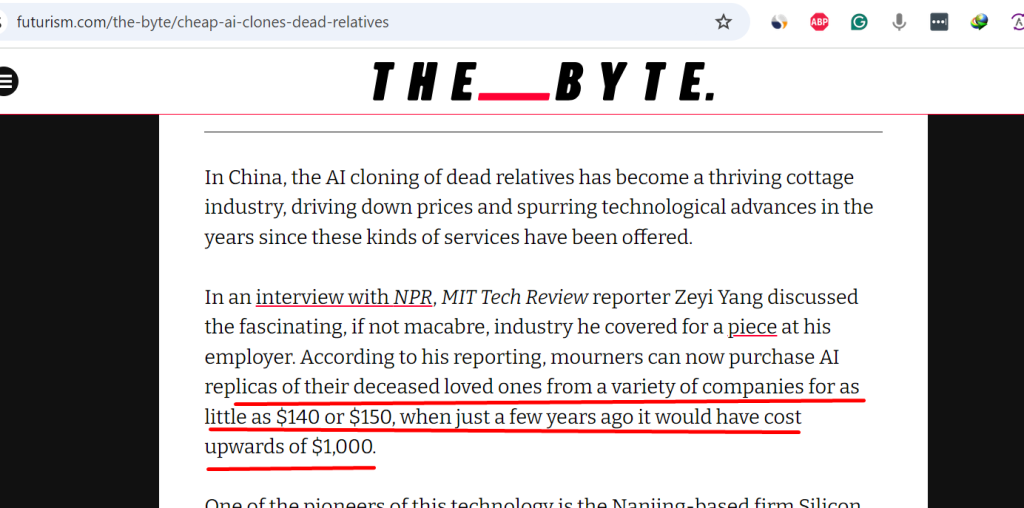Its a universal fact that overcoming grief from the death of our loved ones is one of the most hardest things in life. The emotional grief can be hard to overcome. But now a technology is enabling people to bring back their dead ones in digital replica through Artificial Intelligence.
We are talking about “GriefTech”. This tech aims to sooth the emotional pain and complexity of the grieving process by creating a digital avatar of the dead people with which one can even interact.
A journalist from The Guardian interviewed a man who has been creating a digital avatar of his dead mother through her recordings.
“What was your goal you think about?” asked the reporter
“My goal has always remained to I want to be able to continue to have conversations with her (mother). ” said Justin Harrison, CEO of You, Only Virtual which works on this kind of technology.
As per the official website, the “You Only Virtual” company creates Versona, which is an audio version of you or the dead ones. The technology requires plenty of audio samples of the people who you want to replicate in the digital form. The AI then grasps the bits and pieces of the personality from the audio and combines them to form an audio chatbot that mimics the style and tone of the deceased.
Other AI Platforms in Grief Tech
There are platforms like HereAfter.ai and StoryFile that allow capturing of the videos and recordings of individuals while they are alive.
The AI algorithms then process these recordings in order to create interactive, conversational avatars of the person after they have passed away.
Think of it this way. Just like a generative AI can produce output from LLMs trained on datasets, similarly, plenty of audio conversations of the people can be used as a dataset to form an AI bot. People can then have conversations with this AI agent which may help them to cope and grieve better.
This technology allows the loved ones to engage in conversations with these digital replicas, simulating the experience of speaking with the person as if they were still alive. It may feel weird or repulsive but the technology offers a unique way to preserve memories and maintain emotional connections with a dead person.
There are many similar platforms in various countries. The likes of China alone have nearly a dozen apps or platforms that can digitally revive dead people and make them conversational as if they were alive.
Normally, photos, videos, and audio samples of the deceased person are required to create their virtual versions also known as “Ghost Bots” that can have similar thinking and speech patterns of the person when they were alive.
Cost of Ghost Bots
In a country like China, people are spending nearly close to $700 a year to have a conversation with GhostBots while in a country like the USA, some providers are offering the AI clone for as little as $150. While it is true that the more audio-visual material is available, the likelihood of a better clone, a China-based ghost bot claims that 30-second audio-visual footage is enough to create a digital avatar.

Ethical, Psychological, and Manipulation Concerns
With the rise of Ghost Bots, there are growing concerns about their impact on people especially because the grieving people are emotionaly vulnerable. According to a paper, ghost bots can increase our reliance on the tools instead of moving on with life. If people keep constant conversations with the digital replicas of their loved ones, they may find it difficult to accept the reality.
Ethical concerns include mimicking dead person’s personality through the conversational AI without the proper consent of all family members and mourners.
The possibility of emotional manipulation can also not be denied by the AI digital avatar of the deceased person unintentionally though. After all, there is no technology yet that can completely eliminate hallucination.



